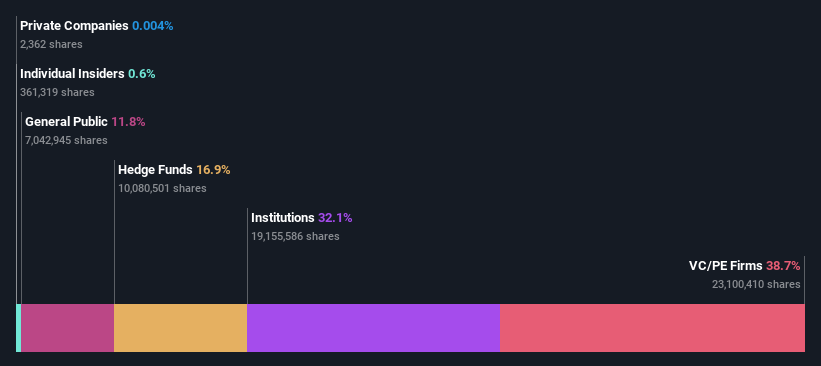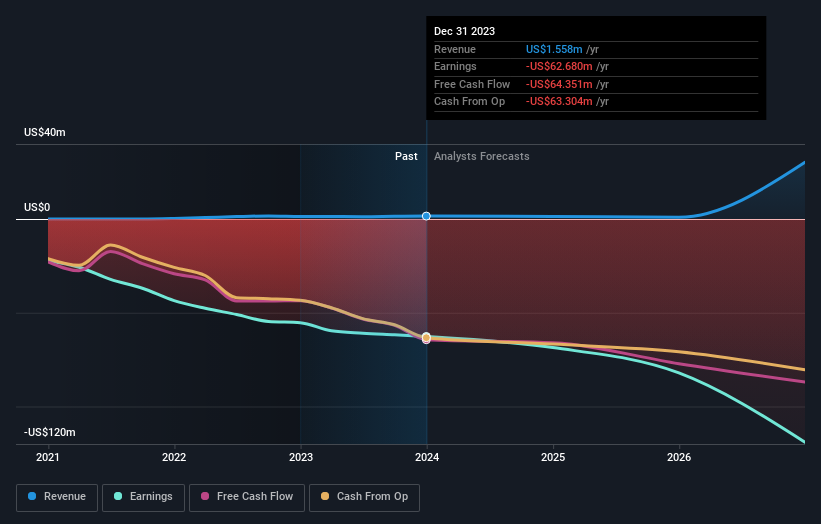Private equity firms who hold 39% of Lyra Therapeutics, Inc. (NASDAQ:LYRA) gained 6.8%, institutions profited as well
Key Insights
Significant control over Lyra Therapeutics by private equity firms implies that the general public has more power to influence management and governance-related decisions
51% of the business is held by the top 5 shareholders
To get a sense of who is truly in control of Lyra Therapeutics, Inc. (NASDAQ:LYRA), it is important to understand the ownership structure of the business. And the group that holds the biggest piece of the pie are private equity firms with 39% ownership. In other words, the group stands to gain the most (or lose the most) from their investment into the company.
While private equity firms were the group that reaped the most benefits after last week’s 6.8% price gain, institutions also received a 32% cut.
Let's take a closer look to see what the different types of shareholders can tell us about Lyra Therapeutics.
See our latest analysis for Lyra Therapeutics
What Does The Institutional Ownership Tell Us About Lyra Therapeutics?
Many institutions measure their performance against an index that approximates the local market. So they usually pay more attention to companies that are included in major indices.
Lyra Therapeutics already has institutions on the share registry. Indeed, they own a respectable stake in the company. This suggests some credibility amongst professional investors. But we can't rely on that fact alone since institutions make bad investments sometimes, just like everyone does. It is not uncommon to see a big share price drop if two large institutional investors try to sell out of a stock at the same time. So it is worth checking the past earnings trajectory of Lyra Therapeutics, (below). Of course, keep in mind that there are other factors to consider, too.
It would appear that 17% of Lyra Therapeutics shares are controlled by hedge funds. That catches my attention because hedge funds sometimes try to influence management, or bring about changes that will create near term value for shareholders. Our data shows that Perceptive Advisors LLC is the largest shareholder with 21% of shares outstanding. Meanwhile, the second and third largest shareholders, hold 9.9% and 7.5%, of the shares outstanding, respectively.
On looking further, we found that 51% of the shares are owned by the top 5 shareholders. In other words, these shareholders have a meaningful say in the decisions of the company.
While it makes sense to study institutional ownership data for a company, it also makes sense to study analyst sentiments to know which way the wind is blowing. There are a reasonable number of analysts covering the stock, so it might be useful to find out their aggregate view on the future.
Insider Ownership Of Lyra Therapeutics
The definition of company insiders can be subjective and does vary between jurisdictions. Our data reflects individual insiders, capturing board members at the very least. Company management run the business, but the CEO will answer to the board, even if he or she is a member of it.
Most consider insider ownership a positive because it can indicate the board is well aligned with other shareholders. However, on some occasions too much power is concentrated within this group.
Our most recent data indicates that insiders own less than 1% of Lyra Therapeutics, Inc.. It appears that the board holds about US$2.3m worth of stock. This compares to a market capitalization of US$373m. Many tend to prefer to see a board with bigger shareholdings. A good next step might be to take a look at this free summary of insider buying and selling.
General Public Ownership
The general public, who are usually individual investors, hold a 12% stake in Lyra Therapeutics. While this group can't necessarily call the shots, it can certainly have a real influence on how the company is run.
Private Equity Ownership
With an ownership of 39%, private equity firms are in a position to play a role in shaping corporate strategy with a focus on value creation. Some investors might be encouraged by this, since private equity are sometimes able to encourage strategies that help the market see the value in the company. Alternatively, those holders might be exiting the investment after taking it public.
Next Steps:
While it is well worth considering the different groups that own a company, there are other factors that are even more important. Case in point: We've spotted 3 warning signs for Lyra Therapeutics you should be aware of, and 1 of them is potentially serious.
If you are like me, you may want to think about whether this company will grow or shrink. Luckily, you can check this free report showing analyst forecasts for its future.
NB: Figures in this article are calculated using data from the last twelve months, which refer to the 12-month period ending on the last date of the month the financial statement is dated. This may not be consistent with full year annual report figures.
Have feedback on this article? Concerned about the content? Get in touch with us directly. Alternatively, email editorial-team (at) simplywallst.com.
This article by Simply Wall St is general in nature. We provide commentary based on historical data and analyst forecasts only using an unbiased methodology and our articles are not intended to be financial advice. It does not constitute a recommendation to buy or sell any stock, and does not take account of your objectives, or your financial situation. We aim to bring you long-term focused analysis driven by fundamental data. Note that our analysis may not factor in the latest price-sensitive company announcements or qualitative material. Simply Wall St has no position in any stocks mentioned.


